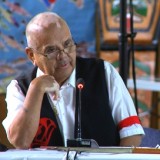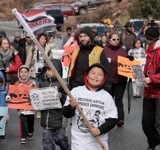Craig McInnes of the Vancouver Sun today has an article essentially supporting the Enbridge Pipeline and the tanker traffic down our coast. His position is that with all the science available these things can be done safely. Craig deserves a trip to the woodshed or, as also happened in my young days, to have his mouth washed out with soap. This usually careful journalist ignores two essential points: the mathematical certainty of accidents and the appalling consequences that will follow.
With the pipeline, no amount of surveillance will prevent ruptures, leaving aside the possibility of vandalism. As we know, this modern, scientifically savvy company, Enbridge, has had 811 accidents since 1998. Craig seems to forget that we’re dealing with an 1,100 km pipeline through both the Rockies and the Coast Range thence through the Great Bear Rainforest and over 1,000 rivers and streams, including several that are vital salmon spawning locations. This means that even when a leak or rupture occurs, the only way to get to it is by helicopter. Surveillance may be state of the art, indeed, way ahead of its time – but what’s the good of surveillance if you can do nothing?
The tanker situation is brushed aside with the notion that double hulling will end problems. Craig doesn’t seem to know that there have been several major double hulled catastrophes in the past couple of years and none of them hit rocks but other ships!
It frightens me a little that Craig seems to brush aside the concerns of First Nations as if there concerns are of no moment but simply sentimental shots in the war against palefaces. The National Energy Board’s Joint Review Panel on Enbridge heard an earful in Bella Bella from experienced First Nations Mariners about the considerable dangers of navigating their coastal waters – watch video here. The Common Sense Canadian in its March 8 edition also published this must-read account on the topic from longtime coastal fisherman by John Brajcic (also pasted below in its entirety)
These First Nations have lived and fished this super hazardous coast for a millennium or more. Their forte is not the efficacy or otherwise of science but what happens when there is a spill which they and anyone else who has thought it through is a certainty.
Allow me to use my favourite analogy: Suppose you had a revolver with 100 chambers and only one bullet and you stuck it up against your temple. If you are only going to pull the trigger once, the odds are easily calculable. You can do the same with any number. If, however, you are going to pull that trigger with no restriction as to number of times, you are no longer looking at a probability but an explosion waiting to happen. It becomes a mathematical certainty.
Now let’s suppose that the bullet was a marshmallow. It wouldn’t matter because no harm would be done. Bitumen from the Tar Sands is not marshmallow!
Bitumen doesn’t mix with water and for all practical purposes doesn’t evaporate. What it touches it kills. Spills on land or sea are lethal, and here is the worst part – it is all but impossible to clean up. The July 2010 Enbridge spill into the Kalamazoo River, easily accessed, hasn’t been cleaned up yet and likely never will.
It is this fact that puts paid to arguments like Craig’s – the consequences of a spill are utterly devastating – this isn’t like the oil that spilled out of the Exxon Valdez but many, many times worse.
Craig does his readers much harm by not making an honest assessment of the risks involved (in fact they are certainties) and worse – not telling the horrible consequences which must flow.
Have you thought about whether or not there’s a soul? What about near death experiences? Should the Book of Revelation scare the pants off us? Find out what other religions and experts say with my new book The Home Stretch available online for your computer, kindle, kobo or iPad for the miserly sum of $9.99
John Brajcic’s must-read account of the navigational dangers of BC’s north and central coast
As a fisherman who has worked his whole life on the coast of BC, I have many concerns about oil tankers leaving Kitamaat (proper spelling double “a” and it means ‘people of the snow’).
All of the discussions, I have heard, have been about concerns regarding pipeline ruptures and what can happen on the land route. My concern is what will happen if there is a loaded oil tanker heading to sea and it hits a reef or shore or breaks up causing another Exxon Valdez.
Our family has a long history in the area. My father started fishing there in the 30’s and in 1949, at the age of 13, I went out on his seine boat. In 1957 I became a Captain of a seiner and I fished the area for over 50 years, usually from 5 -20 weeks per year. At present my son operates our family’s seiner and continues to fish this area. Our combined family’s presence in this area is over 80 years.
I have been hired by Fisheries and Oceans Canada to participate in stock assessments for salmon and herring. In 1968 we were hired by Shell Oil Company to assist in the positioning of Sedco’s drill rig in Hecate Straits.
We have spent so much time in Fisheries and Oceans Canada designated area 6 that lifelong friends – the late Alan Hall of Kitamaat and Johnny Clifton of Hartley Bay – were made. I have seen the waterfall at Butedale frozen solid, bone dry and running so hard you could not tie up your boat.
With our family’s 80 plus years of fishing in the Whale Channel area we have firsthand knowledge of tides, weather, types of fish and bird life. The area from Kitamaat to Hecate Straits is designated Area 6, by Fisheries and Oceans Canada and is the most consistent salmon producing region in British Columbia with runs in the odd and even years.
In Area 6 there is:
- Within the Central coast area 128 salmon bearing streams
- Kitasu Bay to McInnes Island is a major herring spawning ground
- All 5 species of salmon, herring, crab, mussels, clams, abalone, prawns, eulachons, pilchards, hake, geoduck, mackerel, halibut cod, pollock, otters, eagles and many birds, plus whales and porpoises
- Tides that fluctuate over 20 feet causing currents of up to 5 knots
- Being a region of heavy snow and glaciers there are very strong freshets from May to the end of July
- The outflow winds from Douglas Channel can be extreme during summer and winter
- Weather in Hecate Straits – because of strong complex currents, waves have been recorded up to 30 metres. The highest wind gusts recorded for November, December, January, February and March is 180 -190-plus km per hour.
If a ship enters Laredo Channel from Hecate Straits at McInnes Island the tanker would have Lenard Shoal and Moody Bank at the bottom of Aristazabl Island. On the east side of Aristazabl Island there are 2 very dangerous rocks known as Wilson and Moorhouse. Campania Sound is also a very treacherous body of water from Dupont Island to Hecate Straits.
There are many rocks and to name a few, Bortwick, Cort, Ness, Evans, Cliff and Janion also Yares Shoal. This area is a minefield of reefs. These rocks are spread out between Rennison Island, Banks Island and Campania Island. This route would be extremely dangerous to tanker traffic. Using the Otter Pass route, Nepean rock becomes a very prominent problem for ships’ travel.
Should a major oil spill occur I feel an oil boom would not be able to contain it because of the velocity of the current in this area and the oil could travel 20-50 miles in one 6 hour tide. This area is not the Mediterranean or a lagoon.
If a spill occurred in Laredo Channel the herring spawning area at Kitasu Bay to Price Island could be totally destroyed, possibly forever. The eel grass which the herring need to spawn on could be wiped out. Some years over 10,000 tons of herring spawn in this area.
A spill at freshet time would be the most devastating. Due to the differences of its viscosity, salt water is heavier and would be lower and the fresh water being lighter, becomes a shallow layer at the surface. The juvenile salmon live in this fresh water layer as they migrate to sea. The juvenile salmon jump like raindrops and if they were migrating in a spill area the oil could wipe out an entire run. Some streams could become barren of salmon.
I have tried to point out, so people know, the dangers of the entire marine area and what could happen if there is ever a spill. I have spent my entire life around Princess Royal Island and the vicinity. I personally am totally opposed to the Kitamaat terminal for oil tankers.
John Brajcich and his family have been commercial fishermen on BC’s north and central coast – where oil supertankers would pass – for some eighty years.





